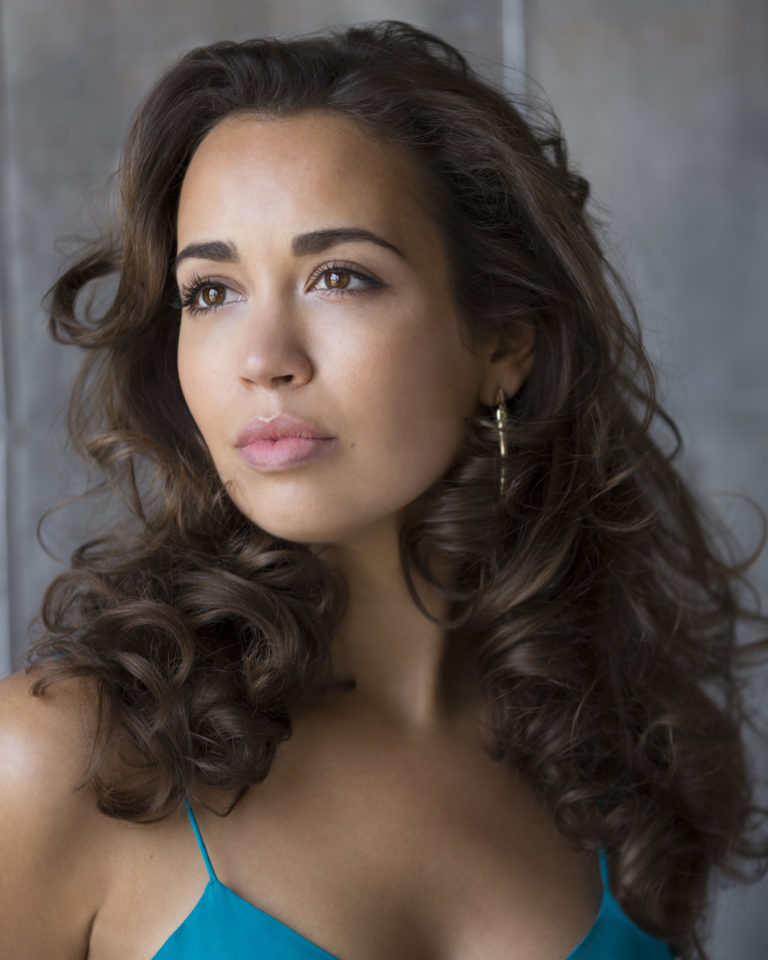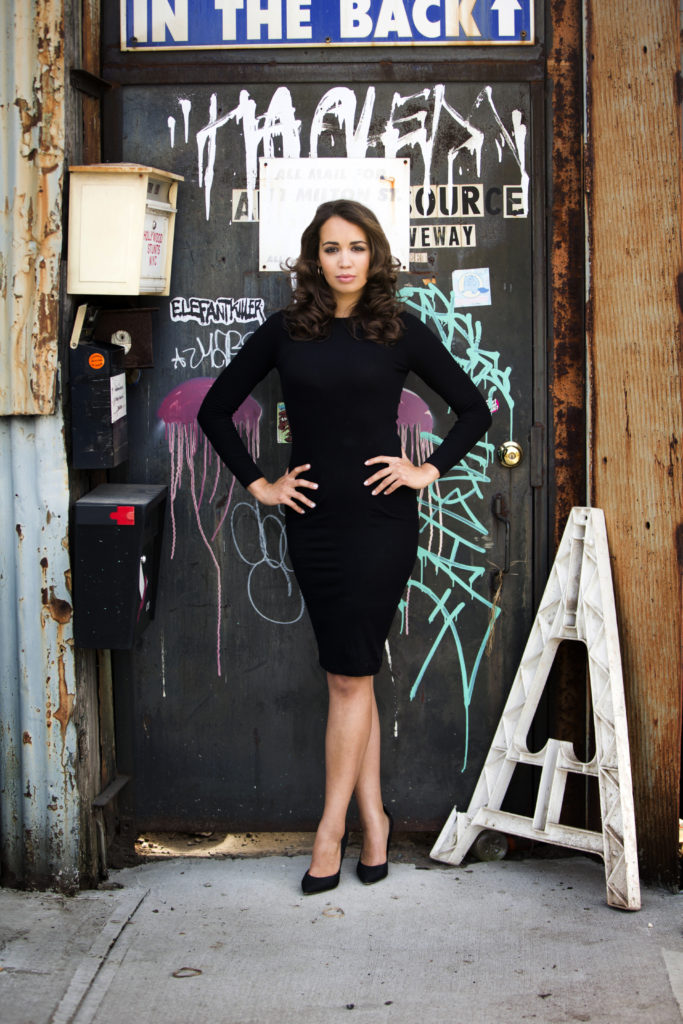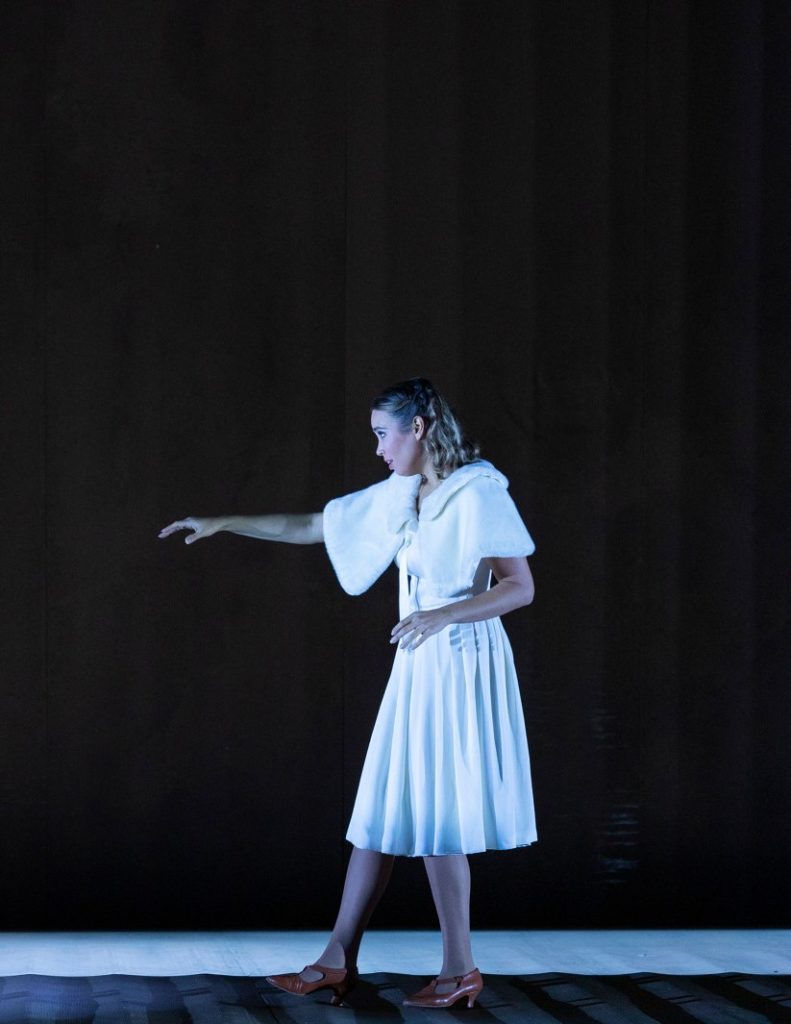NADINE SIERRA : “Opera has always been a sacred art form for me”

She is currently triumphing as Gilda at the Opéra Bastille: between two performances, Nadine Sierra granted us a long interview, in which she tells about her childhood, her career, the evolution of her voice, her projects… A meeting with one of the most talented and endearing sopranos of the moment!
Nicolas MATHIEU : How did your meet lyrical art ?
Nadine SIERRA : Everything started with my Portuguese grandmother. She had always wanted to be an opera singer, but my great grand-father didn’t allowed her to pursue any career because she was a woman. In his mind, her duty was to be a respectable housewife and my mother grew up with her knowing this story.
This was my entry into opera. I showed a fascination with music from a very young age and when I was 6 years old, my mother asked me if I wanted to take voice lessons. I agreed under the condition that I would I practice an hour every day after my weekly lesson. When I reached 10 years old, my voice started developing an interesting timbre that closely resembled a young operatic soprano and she immediately thought about her mother. She thought: “Why don’t I introduce opera to my daughter and see what happens?”. She showed me to a VHS tape that she borrowed from our public library, which played the famous Zeffirelli production of La Bohème at the Met. I became obsessed with it and told her I would become an opera singer one day. This reaction was a déjà vu moment for her due to her mothers’ story, but she allowed me to pursue this dream no matter my being a little girl. Ever since that day, my life was consumed by all things opera.
N.M. : After your lyrical studies, what was the main event that launched your career?
N.S. : It has to be when I met and worked with Marilyn Horne at the Music Academy of the West. In those days, she had her own foundation that allowed young singers to gain experience by performing in various places around the United States. Because I won the first prize of the foundations’ competition that year, she awarded me my debut recital in New York City. I was 19 years old, so it was super cool! But there was a lot of pressure during the event because The New York Times came to review the debut and a few influential people from the business attended, including Marilyn Horne herself. Having this introduction to the business was really the platform on which my young career began to flourish.

© Merri Cyr
N.M. : What are the challenges you meet vocally when you learn opera young?
N.S. : One of the biggest challenges can be dealing with how the voice changes over time. The voice can become richer, sometimes resulting in a lower tessitura, so it makes singing higher more challenging. Therefore, it requires a bit more effort and dedication to train the voice properly. Also, the more well-known you are in the business, the more expectations are put on you. You have to keep the level and quality of singing quite high, even whilst those changes are occurring. Not only the physical changes, but also the mental ones. Our instrument is inside of the body, and I always find it funny how close the larynx is to the brain. Our mental state can impact the way we sing in a very big way.
Therefore, we always have to keep in mind how our minds and bodies are connecting with one another in order to produce truly healthy and great singing.
As for me, the voice has grown quite a bit since 10 years ago. It is becoming fuller, rounder, and accessing the top has become a bit more effortful. It is not as flexible as it used to be, but the voice has become more interesting; more womanly. Also, it can project over an orchestra better than before, so I am very happy with these overall developments. Even if it means my having to change the repertoire from the leggiero coloratura to a more lyrical one, I am fine with this. After all, it’s the exact repertoire I always wanted to be able to sing from the time I was 10 years old.
N.M. : That said, how did the role of Gilda evolve with the evolution of your voice ?
N.S. : Verdi was a genius. He knew how to show character development simply through the vocal parts of each character. Gilda, like Violetta, have this in common that the texture and dramaticism of their vocal parts grow as the operas progress. Gilda’s part is not only belonging to a lyric coloratura because progressively, her vocal lines demand a fuller, lower and dramatic capabilities as her character evolves. It is the same for Violetta.
I was 22-23 years old when I first debuted Gilda. At this time, the first Act was fairly easy for me being that it sits higher than anything else she has to sing later on. But as it progressed, I remember it feeling more difficult and had to make sure I didn’t push my voice in order to be heard over the orchestra in the later acts. Now-a-days, I find the 2nd and 3rd Acts much easier to sing than before and feel my voice becoming more comfortable supporting the larger demands of the role. I feel the voice more in-sync with the part and it’s really magical. After over 10 years of working on and singing Gilda, I feel I can really demonstrate with my voice how she develops into a woman over the short amount of time we watch her.
Gilda au Metropolitan Opera (2016)
N.M. : What do you like about Gilda?
N.S. : I was 16 years old when I began to learn Gilda, so I was essentially her age! All of the things Gilda has to manage, like having an over-protective parent or not having the freedom to explore the world in the way she wants, were things I too felt the impact of during my upbringing. I was very disciplined as a child and my parents didn’t always allow me to have the freedoms I started to fantasize about because they wanted me to be safe. From my personal experience, I also understand why she becomes enamored with the Duke and how being that age, young girls can often find themselves falling for someone who’s not entirely good for them. I had to realize as I grew older, that people aren’t always as they seem and how those realities in life mold you into adulthood. We still hold on to our childhood innocence at a certain point, but ultimately it dissipates as our life experiences become more complex.

Gilda à l’Opéra Bastille en 2021 (© Elisa Harberer / Opéra national de Paris)
The other element of playing Gilda is how some audience members can react to her character. Once I had a discussion with a friend who told me : “Gilda is so stupid. She kills herself for a guy who probably rapes her, and ruins the entire story.” But we must wonder why she allows herself to be killed. She was brought up in a convent, so her education was mostly religion-based and would have probably been focused on the teachings of Jesus. We know that Jesus martyred himself to heal the sins of others and she does the exact same thing. Her last words before Sparafucile gravely injures her are “Dio, loro perdonate” which means “God, forgive THEM”. She sacrifices herself not only for loving the Duke, but also for her father’s life and for the sins being committed by Sparafucile and Maddalena.
As she dies in her father’s arms, she gives him this information and says she will watch him from heaven. She emphasizes that he must seek forgiveness, thus being the greatest lesson she gives to Rigoletto before her last breaths.
It is all about forgiveness. Good must always triumph over evil, and taking vengeance on others can only result in disastrous consequences. She is the savior of the story, and her sacrifice services each of these characters. To be so young and have the courage to choose this fate is extraordinary and for me, makes her the most powerful character in the entire piece.
N.M. : If Gilda can be considered as a “touring role” with which you develop your voice, how do you apprehend the shift to new roles with the changes that accompany it?
N.S. : I feel excited for that shift. The unknown developments can be intimidating at first because our vocal cords are very fragile. They need a lot of attention to process all of the changes and maturity that can go on over time. Even with singing something repetitive like Gilda or Lucia, nothing vocally ever remains the same. That’s one of the greatest beauties and mystery behind the human voice. There is always something new we can learn and grow into, no matter how many times we repeat something.
Not only in the vocal parts, but also in the way in which we embody the characters we play. Because as human beings living our day to day lives, we evolve too. If some of our own personal experiences are painful or challenging, we as performers can use those real-life moments to put more complexities into the characters that we play and sing. This is why, as opera lovers, we find Maria Callas so unforgettable. She was a woman, although extremely talented and educated, who lead a difficult life and certainly used a lot of those personal struggles to interpret the characters she played. This only made her performances more interesting and certainly played a part in her legacy.
N.M. : The stage director’s point of view can also add complexity to the characters… How do you cope with that?
N.S. : Opera has always been a sacred art form for me. My first introduction to opera was with a production that really tells the story, and tells it in a very genuine (and super touching) way. It’s because of that, that I wanted to become an opera singer; not the reverse. I often get the impression that some opera directors are mistaken in the idea that telling the story exactly is a bit redundant, and viewing that somehow as a weakness. Following traditions is not the same as creating something more artistic and having that creative freedom, often translates in modern productions wanting to be “relatable” to the current social experiences we face today.
But the strength behind opera, is opera itself. It is not the concept of other people that make it brilliant. By trying to put ones’ stamp on a genius that already exists, you may risk to lose each time. I strongly feel that it doesn’t need many of those added elements because everything that’s powerful about the piece or story is already there! If one listens to it and feels tremendously moved by it, it can make such an impact. Like leading a 10 year old girl from Florida, for example, to an experience that changes her life and makes her devoted to this art form.
N.M. : What about Lucia?
N.S. : I actually have an amazing story: Lucia is famous for being a super difficult role to sing. When I signed with my current management almost 7 years ago, he presented a lot of interesting contracts right from the beginning. He told me there could be a possibility of a colleague of mine cancelling a Lucia in Zürich a month and a half before accepting the contract. He asked if I could manage the role in such a short amount of time and I accepted the challenge. I was 26 years old.
Lucia di Lammermoor, « Ardon gl’incensi… » (2020)
I learned it with my vocal coach, Kamal Khan, and began rehearsing not even two months later. The Maestro was the legendary Nello Santi, who had conducted this opera with almost every well-known soprano and knew the score without having to even glance at it. The rehearsal period was only to be 4 days long, so this was quite stressful. I asked Maestro to privately work on the role with me and we went over everything bit by bit for almost 4 hours straight. He gave me so much guidance on which vocal variations I could use and gave me the opportunity to really learn from a master of bel canto. Six days later, I made my debut and will never forget how remarkable it was. All of the adrenaline and the excitement was pumping through my veins, and I did everything I could to make this first Lucia as memorable as possible. Meanwhile, Maestro Santi conducted in a way where I could trust each musical nuance he gave me and also gave me freedom to express each phrase as comfortably as I could. This comes from having an incredible amount of expertise and each time I sing Lucia, I’m immediately reminded of this treasure in my memories!
La Traviata : » È strano… » (Hanovre, 2021)
N.M. : And your début as Violetta?
N.S. : It has been said that many great singers of the past dedicated a huge portion of their time studying with their voice teachers. So much so, that many of them even lived with their voice teachers. I have never gone as far as that, but I have worked with my vocal coach (Kamal Khan) for 21 years. While studying Violetta, I invited him and his husband to stay with me for a week in Florida. We studied the role every single day, and went in-depth as to how to play this character in order to discover my own vision into who she is. This is truly the best thing I could have ever done. He and his husband also visited me in Firenze and stayed by my side for an additional 10 days by attending my final rehearsals and coaching me throughout the process. When I finally sang her for the first time on that opening night, I felt I already knew her. I somehow could embody her in a very natural way and sing all of her extremely difficult musical passages with a great sense of security and, dare I say it, ease.
N.M. : What are your next lyrical challenges?
N.S. : I would love to sing Mimi one day and even a Desdemona. As I told you, ever since I was a little girl, this was always to be the repertoire that I would want to sing someday. I’ve now had a real first step in this direction by tackling Violetta. Thankfully, I’m beginning this progression and already have some contracts that are leading to this point, which I’m anticipating with great excitement.
N.M. : And your new projects coming this season?
N.S. : My new album with Deutsche Grammophon is coming out in March 2022. Its’ production was inspired by the story I spoke of regarding my grandmothers’ inability to pursue opera because of her being a woman. Also, I’m playing Lucia di Lammermoor in a new production the Metropolitan Opera is creating that will be broadcast all over the world in HD on May 21st, 2022. I am really looking forward to this and cannot wait to sing this role on the Met stage with colleagues I hold very dear to me. It is a culmination of everything I’ve worked so hard for up until this point and I feel ready for it.
NADINE SIERRA’S ¨PROJECTS
- Rigoletto, Paris, october/november 2021
- Lucia di Lammermoor, Naples, january 2022
- Récital, Opéra Royal de Wallonie, february 2022
- 2e Symphonie (Mahler), Berlin, february 2022
- Lucia di Lammermoor, Munich, march 2022
- Rigoletto, Milan, june/july 2022